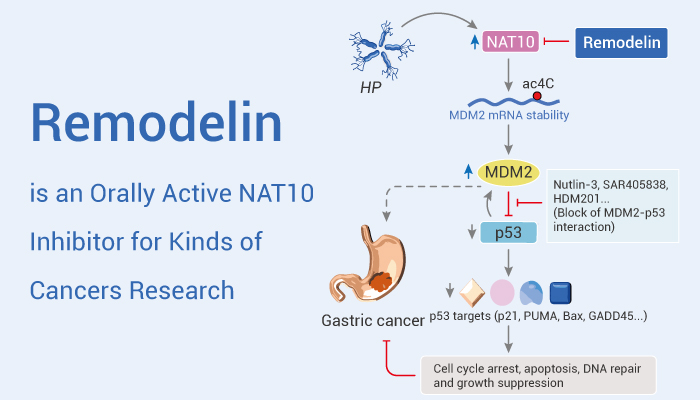N-acetyltransferase (NAT) is an enzyme that catalyzes the transfer of acetyl groups from acetyl-CoA to arylamines, arylhydroxylamines and arylhydrazines. They have wide specificity for aromatic amines, particularly serotonin, and can also catalyze acetyl transfer between arylamines without CoA. N-acetyltransferases are cytosolic enzymes found in the liver and many tissues of most mammalian species, except the dog and fox, which cannot acetylate xenobiotics.Acetyl groups are important in the conjugation of metabolites from the liver, to allow excretion of the byproducts (phase II metabolism). This is especially important in the metabolism and excretion of drug products (drug metabolism).

Remodelin is an Orally Active and Selective NAT10 Inhibitor for Cancers Research
Remodelin is an orally active and selective inhibitor of acetyltransferase NAT10. And Remodelin inhibits NAT10 activitity and slows DNA replication and suppresses growth of prostate cancer cells. Remodelin inhibits the growth of prostate cancer and hepatocellular carcinoma in xenograft model. Remodelin enhances the healthspan in hutchinson-gilford progeria syndrome (HGPS) mouse model.
In Vitro, Remodelin (10-40 μΜ, 1-7 days) inhibits NAT10 activity and cell proliferation with a dose-dependent manner in both AR-positive and AR-negative prostate cancer cells. Remodelin (20 μΜ, 24 hours) inhibits NAT10 and slows DNA replication in prostate cancer cells. Remodelin (1 μΜ, 7 days) decreases nuclear shape defects and increase genomic stability in LmnaG609G/G609G fibroblasts.
In Vivo, Remodelin (2 or 20 mg/kg, i.p., once every two days for 4 weeks) significantly reduces AR-negative prostate cancer tumor growth in tumor xenograft nude mice model. Remodelin (100 mg/kg, p.o.) inhibits NAT10 and significantly enhances the healthspan in aLmnaG609G/G609G hutchinson-gilford progeria syndrome (HGPS) mouse model. Remodelin (5 mg/kg, p.o.) shows a T1/2 of 1.81 hours and oral bioavailability (F%) of 43.5% in mice.
In conclusion, Remodelin is an orally active and selective inhibitor of acetyltransferase NAT10 and can be used in cancers research.
Reference:
[1]. Science. 2014 May 2;344(6183):527-32.
[2]. Int J Mol Sci. 2022 Jun 12;23(12):6573.